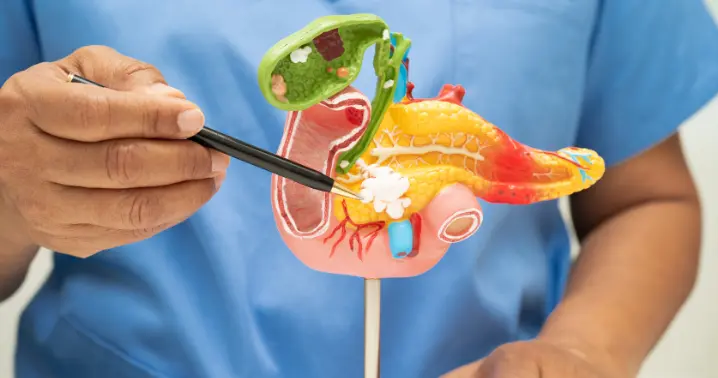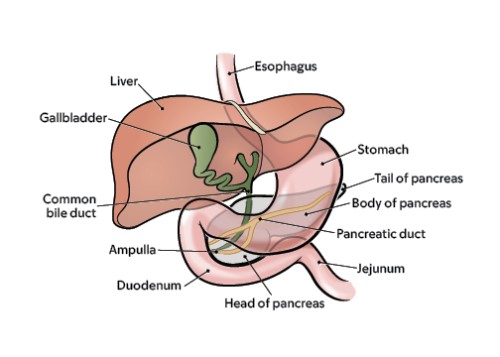- Home
- Pancreatic Cancer
Pancreatic Cancer

Pancreatic Cancer is one of the deadliest forms of cancer globally, with hundreds of thousands of new cases diagnosed each year.
It ranks as the seventh leading cause of cancer-related deaths worldwide, largely due to its aggressive nature and late-stage detection in most cases.
Survival rates remain low, particularly in regions with limited access to early diagnostic tools and advanced treatment facilities.
However, early diagnosis and timely intervention—including access to modern pancreatic cancer treatment options in Ahmedabad—can play a critical role in improving patient outcomes and extending survival.
What is Pancreatic Cancer?
Pancreatic cancer starts in the pancreas, an organ located behind the stomach that helps with digestion and blood sugar control. It often doesn’t show clear symptoms in the early stages, which makes it hard to detect on time.
As the disease progresses, symptoms like stomach pain, weight loss, and jaundice may appear. Because it’s usually found late, pancreatic cancer can be difficult to treat. However, early diagnosis and advanced treatments can help improve outcomes for patients.
Signs and Symptoms of Pancreatic Cancer
Pancreatic cancer symptoms often appear in the later stages, making early detection challenging. If you notice ongoing digestive issues, sudden weight loss, or yellowing of the eyes or skin, it’s important to seek medical attention. Early diagnosis can make a significant difference in treatment outcomes.
Common Signs and Symptoms of Pancreatic Cancer:
- Upper abdominal or back pain
- Unexplained weight loss
- Loss of appetite
- Jaundice (yellowing of skin and eyes)
- Dark urine and pale stools
- Nausea or vomiting
- Fatigue or weakness
- New-onset diabetes or worsening of existing diabetes
Causes of Pancreatic Cancer
- Smoking – Tobacco use is one of the leading risk factors for pancreatic cancer.
- Family History – Having close relatives with pancreatic cancer increases your risk.
- Chronic Pancreatitis – Long-term inflammation of the pancreas may lead to cancer.
- Diabetes – Especially new-onset diabetes in older adults can be an early sign or risk factor.
- Obesity – Being overweight or obese raises the likelihood of developing pancreatic cancer.
- Age – Most cases occur in people over the age of 60.
- Genetic Mutations – Inherited gene changes can contribute to cancer development.
- Diet – A diet high in red and processed meats may increase risk.
- Exposure to Chemicals – Long-term exposure to certain workplace chemicals may also be a factor.
- Age – Most cases occur in people over the age of 60.
- Smoking – Tobacco use significantly increases the risk.
- Obesity – Being overweight or obese raises your chances of developing pancreatic cancer.
- Family History – Having close relatives with pancreatic cancer can increase risk.
- Chronic Pancreatitis – Long-term inflammation of the pancreas is a known risk factor.
- Diabetes – Especially new-onset diabetes in older adults may be linked to pancreatic cancer.
- Genetic Mutations – Inherited gene changes such as BRCA2 or Lynch syndrome can raise risk.
- Poor Diet – A diet high in red and processed meats may contribute to higher risk.
- Alcohol Abuse – Excessive alcohol intake can lead to pancreatitis, which increases risk.
If You Notice Any of These Symptoms
Diagnosis of Pancreatic Cancer
1. Imaging Tests :
- CT Scan / MRI – Helps detect tumors and check if cancer has spread.
- Endoscopic Ultrasound (EUS) – Gives detailed images of the pancreas using a thin tube through the digestive tract.
2. Blood Tests :
- Tumor Markers (CA 19-9) – A substance found in the blood that may be elevated in pancreatic cancer.
- Liver Function Tests – Can indicate blockage or liver involvement.
3. Biopsy :
- Needle Biopsy – Tissue sample taken to confirm cancer under a microscope.
- EUS-Guided Biopsy – Biopsy done during endoscopic ultrasound for accuracy.

Treatments for Pancreatic Cancer in Ahmedabad
Surgery (Pancreatic Resection)
Dr. Shah evaluates operable tumors and oversees procedures such as the Whipple surgery, distal pancreatectomy, or total pancreatectomy.
The goal is to remove the tumor completely while preserving as much healthy tissue as possible.
Chemotherapy
Includes systemic therapy using drugs like gemcitabine or FOLFIRINOX to eradicate remaining cancer cells.
Treatments may be administered before surgery (neoadjuvant) or afterward (adjuvant) based on individual stage and health.
Radiation Therapy
In select cases, Dr. Shah incorporates external beam radiation or combination chemoradiation to shrink tumors and reduce recurrence risk.
Targeted Therapy & Clinical Trials
Dr. Shah assesses tumor genetic markers to determine eligibility for targeted therapies that attack specific molecular changes.
Clinical trials may also be available for access to emerging treatments.
Palliative & Supportive Care
Alongside active treatment, Dr. Shah and his team address symptoms such as pain, digestive problems, or nutrition issues.
Counseling, dietary support, and symptom management help improve quality of life at any stage.
With Dr. Ridham Shah’s expertise and access to modern treatment facilities in Ahmedabad, patients receive comprehensive and attentive care geared toward the best possible outcomes.
Conclusion
Pancreatic cancer is a rare but highly dangerous disease. The challenge lies in its late detection, as it often remains asymptomatic in the early stages.
By the time symptoms manifest, the cancer may have already advanced. Therefore, it is crucial to be vigilant and seek medical assistance promptly if any potential symptoms of pancreatic cancer arise.
Some common symptoms to be aware of include unexplained weight loss, abdominal pain or discomfort, jaundice (yellowing of the skin and eyes), changes in bowel movements, and persistent fatigue. If you experience any of these symptoms or have concerns about your health, don’t hesitate to consult a healthcare professional for proper evaluation and timely diagnosis.

Why Dr. Ridham Shah
A Surgical Oncologist Practicing In The City Of Ahmedabad
- Experience of a decade in treating cancer
- Expertise in Laparoscopic cancer surgery, Robotic cancer surgery
- Expertise in Digestive System Cancers, Colorectal cancers , Peritoneal cancers, advanced abdominal cancers
- Expertise in Cytoreductive Surgery, HIPEC, PIPAC
- Excellent support staff to help you during treatment
- 360 degree care
Specialities

Ovary Cancer

Rectal Cancer

Colon Cancer

Endometrial Cancer

Liver Cancer

Esophageal Cancer

HIPEC Surgery

Robotic Surgery

Vulvar Cancer

Gallbladder Cancer

Stomach Cancer

Pancreatic Cancer

Cervix Cancer
